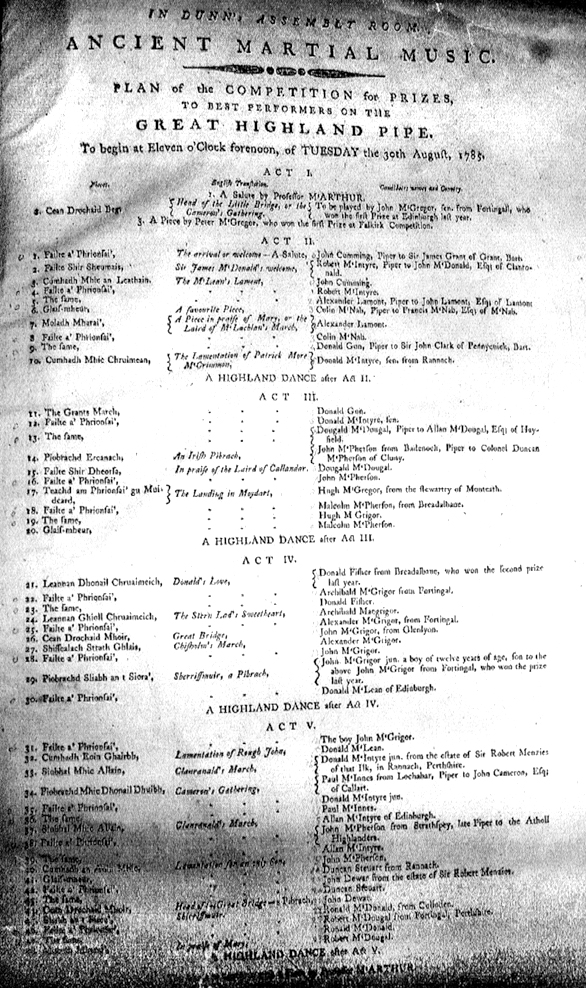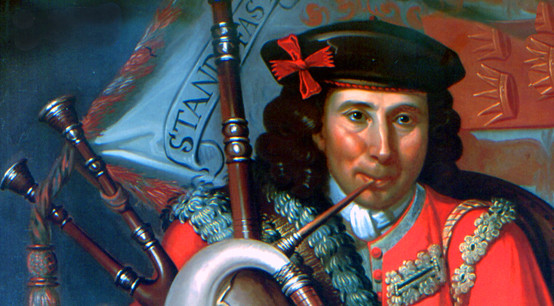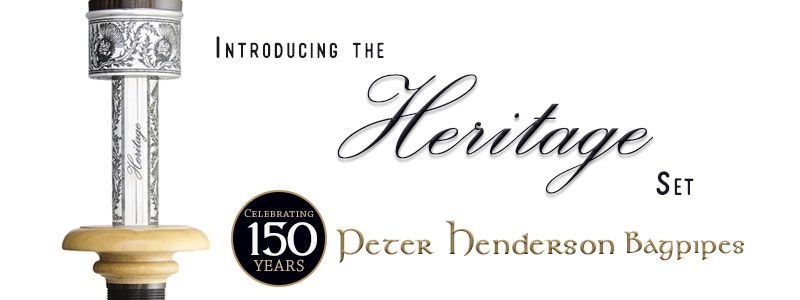Poster Gives Interesting Insight into 18th Century Competition
By Robert Wallace

This unique copy of a poster made for the Prize Pipe competition in 1785 Edinburgh yields some fascinating information about what pipers played 230 years ago. It doesn’t seem to be terribly different from today. Most pipers played more than once but it would appear that no less than 50 piobaireachd were heard during the course of the day, a staggering number, and even in the pre-grading days of modern competition we were unlikely to hear that amount of music in one day. Would it be fair to assume that there was no tuning between performances and that the idea that grounds be repeated between variations so extending tunes considerably, would have been considered unacceptable? Furthermore, isn’t it incredible that only 40 years after the final, fateful, Jacobite Rising and the repression that followed, the Act of Proscription et al, that there was such a healthy number of pipers active and willing to compete for the coveted pipe?
Whatever way we look at it, it was clearly a very long day with dances interspersing the music. A welcome break I am sure. I would be interested to hear from others who will be able to extrapolate further interesting facts from the poster. The winner of the Prize Pipe on this occasion was Donald McIntyre, Sen., from Rannoch (see below).
The poster reads (apologies for errors in transcribing – it is obscure in parts):
In Dunn’s Assembly Room, ANCIENT MARTIAL MUSIC; Plan of the Competition for Prizes to the best performers on the
GREAT HIGHLAND PIPE
To begin at Eleven o’Clock forenoon, of Tuesday the 30th August 1785
Act 1
1 A Salute by Professor McArthur
2 Cean Drochaid Beag, Head of the Little Bridge or the Cameron’s Gathering, to be played by John McGregor, Sen., from Fortingall, who won the prize pipe at Edinburgh last year
3 A Piece by Peter McGregor who won the first prize at Falkirk Competition
Act II
1 Failte a’ Phrionsa [Prince’s Salute] – The arrival or welcome – A Salute – John Cumming, Piper to Sir James Grant of Grant, Bart.
2 Falte Shir Sheumais – Sir James MacDonald’s Welcome – Robert McIntyre, Piper to John McDonald, Esq., of Clanronald
3 Cumhadh Mhic an Leathain – The MacLean’s Lament – John Cumming
4 Failte a’ Phrionsa – Robert McIntyre
5 The same – Alexander Lament, Piper to John Lamont Esq., of Lamont
6 Glas mheur – a favourite piece [The Fingerlock], Colin McNab, Piper to Francis McNab of McNab
7 Moladh Mhairi – A piece in praise of Mary or the Laird of McLachlan’s March – Alexander Lamont
8 Failte a’ Phrionsa – Colin McNab
9 The same – Donald Gun, Piper to Sir John Clark of Pennycuick, Bart.
10 Cumhadh MhicChruimean – The Lamentation of Patrick More McCrimmen
A Highland Dance after Act II
Act lll
11 The Grant’s March [Craigellachie?] – Donald Gun
12 Failte a’ Phrionsa – Donald MacIntyre, jun
13 The same – Dougald McDougal, Piper to Allan MacDougal of Ilay
14 Piobrachd Eroanach – Irish Pibrach – John MacPherson, from Badenoch, Piper to colonel Duncan MacPherson of Cluny
15 Failte Shir Dheorla – In Praise of Lord Callander – Dougald McDougal
16 Failte a’ Phrionsa – John MacPherson
17 Teachd am Phrionsa gu Muidart [My King Has Landed in Moidart] – The Landing in Moidart – Hugh McGregor from the Stewartry of Monteath
18 Failte a’ Phrionsa – Malcolm McPherson from Breadalbane
19 The same – Hugh McGregor
20 Glais Mheur – Malcolm McPherson

Act IV
21 Leannan Dhonail Chrualmeich – Donald’s Love – Donald Fisher from Breadalbane, who won second prize last year
22 Failte a’ Phrionsa – Archibald McGrigor from Fortingall
23 The same – Donald Fisher
24 Leannan Ghiall Chrualmach – The S? Lad’s Sweetheart – Archibald McGrigor
25 Failte a’ Phrionsa – Alexander McGrigor from Fortingall
26 Cean Drochaid Mhoir – Great Bridge – John McGrigor from Glen Lyon
27 Shissealach? Strath Ghlais – Chisholm’s March – Alexander McGrigor
28 Failte a’ Phrionsa – John McGrigor
29 Piobrachd Sliabh an t Siora’ – Sheriffmuir, a Pibrach – John McGrigor jun. a boy of twelve years of age, son to the above John McGrigor from Fortingall, who won the prize last year
30 Failte a’ Phrionsa – Donald McLean of Edinburgh
A Highland Dance after Act lV
Act V
31 Failte a’ Phrionsa – the boy John McGrigor
32 Cumhadh Eoin Ghairbh – Lamentation of Rough John – Donald McLean
33 Suibhal Mhic Allain – Clanranald’s March – Donald McIntyre jun. from the estate of Sir Robert Menzies of that Ilk, in Rannach, Perthshire
34 Piobrachd Mhic Dhonail Dhuibh [Black Donald’s March] – Cameron’s Gathering – Paul McInnes from Lochabar, Piper to John Cameron Esq of Callart
35 Failte a’ Phrionsa – Donald McIntyre jun
36 The same – Paul McInnes
37 Sibhal Mhic Allain – Clanranald’s March – Allan McIntyre of Edinburgh
38 Failte a’ Phrionsa – John McPherson, from strathspey, late piper to the Atholl Highlanders
39 The same – Allan McIntyre
40 Cumha an Aoin Mhic – Lament for the Only Son – John McPherson
41 Glais Mheur – Duncan Steuart from Rannach
42 Failte a’ Phrionsa – John Dewar from the estate of Sir Robert Menzies
43 The same – Duncan Steuart
44 Cean Drochaid Mhoir – head of the Great Bridge – a pibrachd – John Dewar
45 Sliabh an t Siora’ – Sheriffmuir – Ronald McDonald from Culloden
46 Failte a’ Phrionsa – Robert McDougal from Fortingal, Perthshire
47 The same – Ronald McDonald
48 Moladh Mhari – In Praise of Mary – Robert McDougal
A Highland dance after Act V
Of the proceedings Angus MacKay (with input from scribe Henry Whyte no doubt) tell us in his book of this momentous occasion:
‘July 1785 – the first prize was unanimously voted to Donald McIntyre, senior, from Rannoch, a man of 75 years of age; the second to Colin MacNab, piper to Francis MacNab Esq., of MacNab; and the third to Paul McInnes, Piper to John Cameron Esq. of Callart. There were present 25 performers and competitors. The competition was introduced by a salute played by Professor MacArthur, Piper to the Highland Society of Edinburgh, and by a piece performed by John MacGregor who won the first prize last year. A piece was also played by Patrick MacGregor, and the whole concluded with Clanranald’s Salute, played in a very masterly style by Professor MacArthur.’
Tune in tomorrow for some thoughts on this extraordinary piping extravaganza which took place in the capital just shy of 230 years ago.



















The portrait is of WILLIAM Cumming, painted in 1715 by Richard Waitt…NOT John. It is highly unlikely that William was above ground seventy years later!
Can’t get everything right Iain. Thanks for the correction. I thought he looked a bit early. Will change caption. I wonder if he was related to John? RW
Well if accuracy is what you are after the picture actually has the date 1714 on it. He is dressed in the uniform of the regiment raised by Col Alex Grant of Grant in 1709 and which had been serving in the Low Countries until 1712. Both he and the regiment were on the government side in the 1715 event.
Wiiliam had ‘history’ before then having in 1708 been among a number of Grants who were charged with forcibly disinterring a newly buried child from Rothiemurchus churchyard and moving it elsewhere.
John Cumming was either his grandson or grand-nephew and was sent to Donald MacArthur for training in 1772. The payments for his time in Skye are among the Grant papers.
Many thanks for that Keith. I suspected he might have been related.
Thank you for publishing this antiquity. Were the tunes played then as long as ours today? Perhaps they played the ground and some variations? I find it difficult to believe that Padruig Og’s Lament, given it’s complexity, could have been played on a chanter like the famous Iain Dall instrument with no tape. Just my $0.02 from Brookings Oregon, USA
Cheers,
Keir Todd
Where did this emerge from? Some time ago I read an account from a “piping historian” suggesting than the term ‘Ancient Martial Music’ was introduced by Donald MacDonald to add credibility to his publication of 1820. It seems the term was in use 35 years earlier? I hope I have the years and the mathematics correct, in which case the tunes were probably well rehearsed and played fairly extensively prior to the 1785 date. Doubtless other tunes were also in the pipers’ repertoires This does not tell us anything of how the tunes were played. Doubtless the Donald MacDonald publication of 1820 carries a lot of the tunes and in this cold windy day after taking the dog for a walk, trying to imagine the scene in 1785, I will sit with a cup of tea and a dram and compare the tunes in the list to the Donald MacDonald book. There will be some who will know this without having to consult the book.
Interesting stuff and any notion we have of superiority of tune knowledge should be resisted. Those taking part would have distances to travel to the venue and they only had the ‘horse power’ in the most basic fashion to get there.
Cheers
Duncan Watson